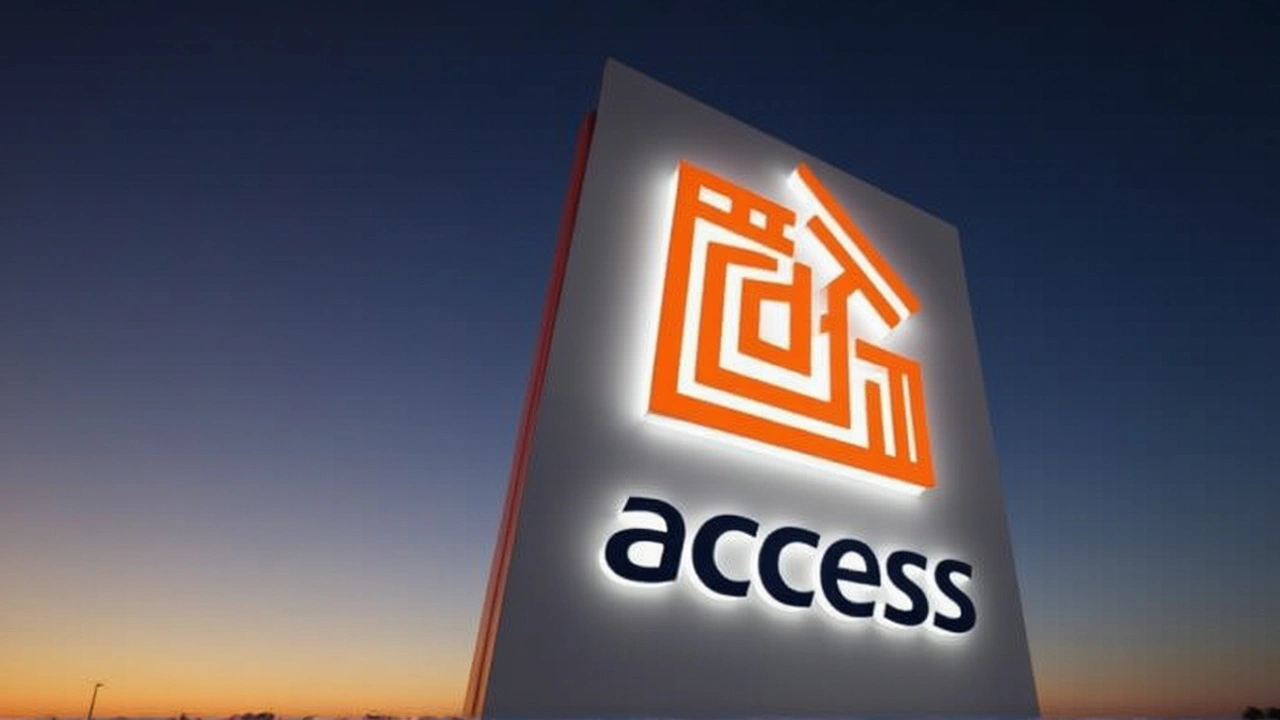Access Bank Restores Services After Nationwide Outage Following Oracle Upgrade

When Access Bank Plc announced on February 24, 2025 that all its electronic channels were back online, customers breathed a collective sigh of relief after a day‑long blackout that threatened to stall millions of transactions.
The outage hit Nigeria’s capital and its surrounding states on Sunday, February 23, when the bank’s scheduled upgrade of the Oracle Flexcube core‑banking platform went sideways, shutting down USSD, internet banking, ATMs and POS terminals from 2:00 AM until 1:00 PM.
In a terse X post, the bank reassured users: “Our USSD banking is fully restored! You can now dial *901# to enjoy fast, easy, and seamless banking. Thank you for your patience.” The message was accompanied by a longer statement that apologized for the inconvenience and promised tougher safeguards for future roll‑outs.
Why the upgrade mattered
Access Bank’s core‑banking modernization was billed as a “phased” migration to Oracle’s Exadata and Private Cloud Appliance infrastructure, a move meant to lift daily processing capacity beyond 35 million transactions. The upgrade aimed to replace legacy middleware that had become a bottleneck for new digital products such as the AccessMore mobile app.
According to Oracle, the Flexcube enhancement would give the bank real‑time settlement, better fraud detection and a smoother customer experience across the 24 markets where the bank operates.
The disruption in plain sight
For ordinary Nigerians, the technical jargon translated into very tangible problems. One shopper, who asked to stay anonymous, recounted trying to buy goods worth N33,150 at a busy market in Amuwo‑Odofin Local Government Area. He could not complete the payment through USSD, leaving the vendor frustrated and the goods stuck on the shelf.
Another voice, Lagos‑based trader Chioma Alex, told the media, “My USSD transactions kept failing for two days after the upgrade.” A young professional named Michelle complained that her transaction history vanished from the AccessMore app, while Afeez Tunde simply could not open the app at all.
These anecdotes echoed a broader pattern that had plagued the sector in 2024, when banks such as GTBank, Sterling Bank and Zenith Bank endured weeks‑long service outages after massive core‑banking swaps.
Bank’s technical response and communication
Within hours, the bank’s IT war‑room rolled out a series of patches, restoring connectivity to the USSD gateway, the AccessMore API and the card‑processing network. By 1:00 PM, the majority of services were functional, and the bank’s X account posted a detailed timeline of the restoration steps.
Roosevelt Ogbonna, Group Managing Director and CEO of Access Bank, said in a press briefing, “We chose a phased approach because a one‑size‑fits‑all upgrade would have been riskier for our 60 million customers spread across three continents.” He added that the bank would continue to monitor transaction latency for the next 48 hours to ensure stability.
The upgrade also introduced Oracle Exadata’s high‑availability features, which automatically reroute workloads to standby nodes in case of a hardware glitch. According to an internal memo, the bank expects a 15 % reduction in transaction‑failure rates once the new platform fully stabilises.

Industry perspective: lessons from the 2024 upgrade rush
Banking analysts note that the 2024‑2025 period saw an unprecedented scramble among Nigerian banks to modernise legacy systems before the Central Bank’s new digital‑banking compliance deadline. While the rush delivered faster services for some, it also exposed weaknesses in change‑management practices.
“Access Bank’s approach was smarter on paper,” says Tunde Adeyemi, senior analyst at FinTech Research Africa. “But the reality is that any core‑banking switch of this magnitude will cause at least a few hiccups. The key is how quickly you can restore service and communicate transparently, which Access Bank did better than most.”
In contrast, GTBank’s upgrade in early 2024 left customers without online banking for over a week, prompting a regulatory warning from the Central Bank of Nigeria. Sterling Bank faced a similar saga, with ATMs offline for ten days in some regions.
What’s next for Access Bank?
The bank has already scheduled its next maintenance window for Sunday, April 27, 2025, from 12:00 AM to 6:00 AM. The notice says debit cards, the AccessMore app, Primusplus, ATMs, POS terminals and the *901# USSD line will be temporarily unavailable, while credit cards and dollar‑denominated debit cards will stay active.
Customers are advised to plan cash withdrawals ahead of the maintenance and to use the bank’s web portal for non‑critical transactions during the six‑hour window.
Looking ahead, Access Bank plans to roll out a new AI‑driven chatbot on the AccessMore app by Q4 2025, leveraging Oracle’s autonomous database to deliver instant support for common queries – a move that could further cushion future upgrade shocks.
Broader impact on Nigeria’s digital banking future
These events underscore the delicate balance between speed and stability in a market that is rapidly embracing mobile money. With over 60 million customers relying on digital channels for everything from school fees to small‑business payroll, even a few hours of downtime can ripple through the economy.
Regulators are now pushing for a more coordinated rollout schedule across the industry, aiming to reduce simultaneous outages that could strain the nation’s payment rails. If Access Bank’s phased upgrade proves resilient, it may become the template for other banks navigating the same digital transformation journey.

Frequently Asked Questions
Why did Access Bank’s upgrade cause a service outage?
The upgrade replaced the bank’s legacy core‑banking engine with Oracle Flexcube, which required a temporary shutdown of the USSD gateway, internet banking servers and card‑processing nodes. The migration was scheduled for low‑traffic hours, but unforeseen integration issues extended the downtime.
How many customers were affected by the February 23 outage?
With more than 60 million account holders, the outage impacted virtually every user trying to access USSD, mobile app, ATM or POS services on February 23. Exact figures are unavailable, but the bank reported spikes in support tickets and social‑media complaints throughout the day.
What steps is Access Bank taking to prevent future disruptions?
The bank is adopting Oracle’s high‑availability architecture, conducting extensive pre‑production testing, and rolling out updates in staggered regional phases. It also pledged clearer communication, with advance notices for any planned maintenance windows.
How does this incident compare with outages at other Nigerian banks?
Unlike GTBank’s week‑long internet‑banking shutdown in 2024, Access Bank restored services within 11 hours. However, both incidents highlight the sector‑wide challenges of modernising legacy systems under tight regulatory timelines.
When is the next scheduled maintenance for Access Bank?
The bank announced a maintenance window for Sunday, April 27, 2025, from 12:00 AM to 6:00 AM. During that period, debit cards, the AccessMore app, ATMs, POS terminals and the *901# USSD line will be offline, while credit cards and dollar debit cards remain active.

Comments
Amber Brewer
October 3, 2025 AT 04:38Access Bank’s quick restoration shows they have a solid fallback plan. If you’re still without USSD, try using the web portal for urgent transfers. Keep an eye on the X feed for any further updates on latency. Back‑up cash withdrawals early next week to avoid the next maintenance window.
Kim Coulter
October 4, 2025 AT 03:08Nigeria’s drive to overhaul its banking infrastructure signals a bold stride toward global competitiveness.
The recent Oracle Flexcube upgrade, despite the hiccup, proves that local banks are not afraid to adopt world‑class technology.
What many overlook is the patriotic pride that comes from seeing home‑grown fintech ecosystems thrive alongside multinational giants.
A truly sovereign financial system must balance speed with security, and Access Bank’s phased approach flirted with that ideal.
While the outage was inconvenient, it also highlighted how dependent we have become on digital arteries.
The lesson is that no system, however advanced, can be immune to human error or unforeseen integration bugs.
Yet, the resilience displayed-restoring services within eleven hours-should be applauded as a manifestation of national tenacity.
Critics who demand flawless execution ignore the reality that every transformational project carries risk.
In a continent where many still rely on cash, the ability to bounce back quickly protects everyday livelihoods.
Moreover, the bank’s commitment to invest in high‑availability architecture aligns with the broader goal of digital sovereignty.
It also sends a message to regulators that self‑regulation can complement oversight, reducing the need for heavy‑handed interventions.
As citizens, we must support such ambitious ventures while demanding transparency and accountability.
The upgrade will eventually enable real‑time settlements, which could lower transaction costs for the average consumer.
When the dust settles, the true measure of success will be how many small businesses can finally access seamless payment channels.
Until then, let’s celebrate the progress and keep pushing for an even more robust digital banking future.
Michelle Toale-Burke
October 5, 2025 AT 01:38Wow, that outage was a nightmare 😩
Amy Paradise
October 6, 2025 AT 00:08Totally get the frustration, downtime feels like a personal affront. I was trying to pay rent via USSD and the screen just froze. Luckily, the web portal stayed functional, so I could finish the transaction. It’s a reminder to always keep an alternate method handy. Next time, a quick check on the bank’s social media can save you the hassle. Keep your chin up, the outage’s behind us now 😊
Janette Cybulski
October 6, 2025 AT 22:38Hey, I see a lot of people feeling uneasy after the service dip, and that’s understandable. The bank’s rapid response did restore most channels, which is a positive sign. It’s also worth noting that the upcoming AI chatbot could help flag issues faster. While the outage was a bump, the long‑term benefits of a modern core could outweigh this short‑term pain. Let’s stay optimistic that the next upgrade will be smoother. Everyone’s patience really helped push the fix forward.
Mildred Alonzo
October 7, 2025 AT 21:08Access Bank did roll out patches fast but still some users report missing data. The timeline posted was clear but the wording could be simpler. It seems the core swap introduced a few bugs that will need extra testing. Overall the bank shows commitment to fix issues quickly
Elizabeth Bennett
October 8, 2025 AT 19:38While optimism is good, we must also hold the bank accountable for the next maintenance window. The notice about the April 27 blackout is detailed, yet many users still won’t have access to debit cards. It’s crucial that the bank conducts thorough regional testing before the cutover. A proactive communication strategy will prevent repeat frustrations. Let’s push for transparent reporting on any post‑upgrade glitches.
linda menuhin
October 9, 2025 AT 18:08i cant help but wonder if tech upgrades are just modern day alchemists turning code into gold. sometimes the gleam blinds us to the rust underneath. Access Bank's hiccup shows that even big banks are mortal. maybe we need more humility before we push the button. the world moves fast, but our patience should move faster. i think we all learn something when the servers go down. keep calm and trust the process, or dont. either way, the future is still uncharted.
Jeff Abbott
October 10, 2025 AT 16:38Honestly, Access Bank’s outage is just another example of banks flirting with disaster because they chase flashier tech. They think a flashy Oracle update will make them look cool, but they barely consider the everyday users. The “phased approach” sounded like a buzzword, not a real safety net. It’s pathetic that customers still have to scramble for cash when a bank can’t keep its own systems alive. Regulators should step in before more banks ruin the payment rails. This isn’t innovation, it’s reckless showmanship. The industry needs a reality check.
Quinton Merrill
October 11, 2025 AT 15:08Interesting points, Jeff. While the upgrade may have caused inconvenience, it also aims to improve long‑term reliability 😊. It’s true that banks must balance innovation with stability, and regulators are watching closely. Let’s hope the next phase delivers on its promises without another blackout. Keeping the conversation constructive will benefit everyone 👍